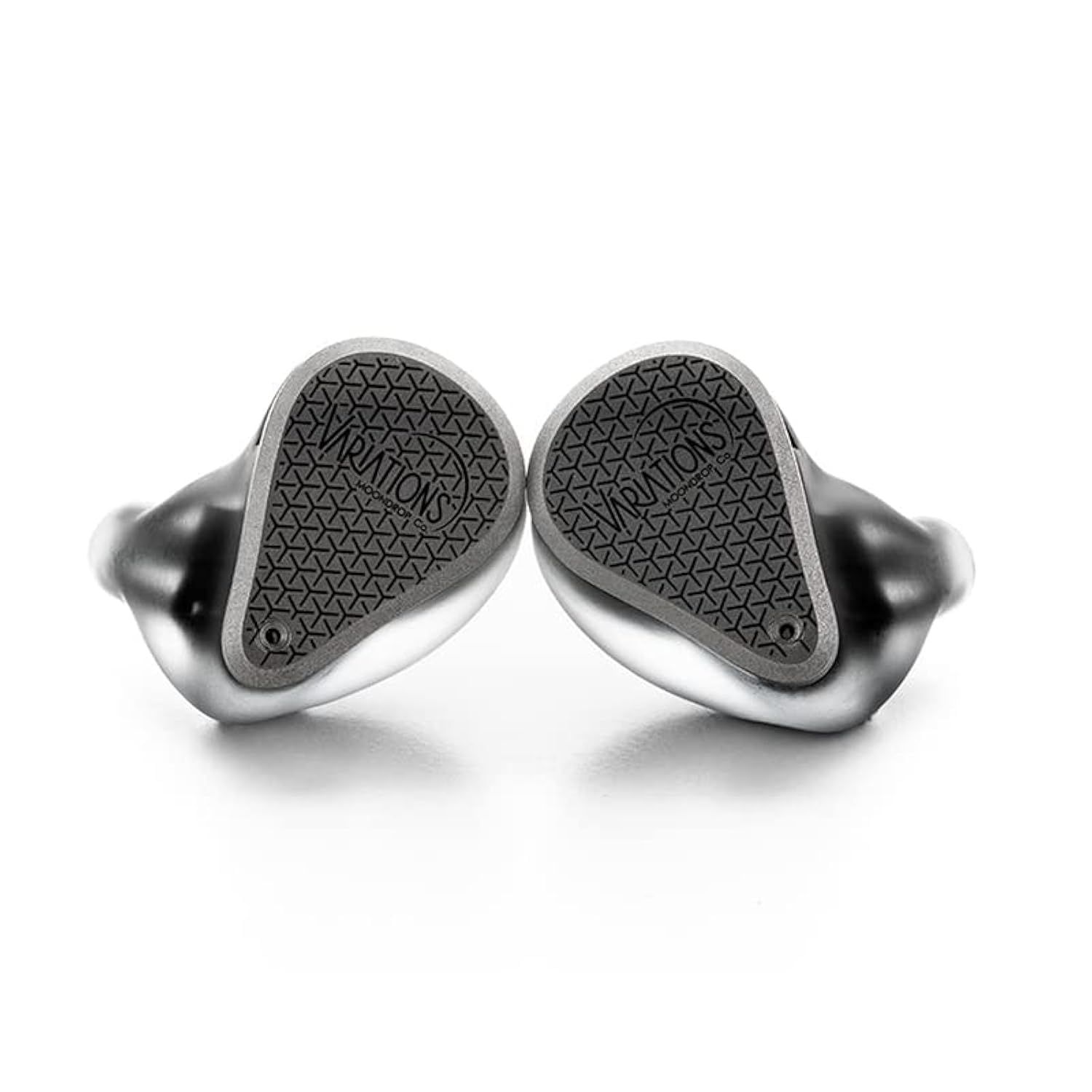Gatevs.Variations
Sound & Specs Comparison
Information
Both IEMs are widely regarded in the audiophile community. See how they differ in terms of sub-bass response, upper mids, clarity, and overall tonality. Spider charts and rating breakdowns included.
Objective Comparison
Facts, details, stuff.
| General Info | Gate | Variations |
|---|---|---|
| Brand | Truthear | Moondrop |
| Country | China | China |
| IEM Description | – | Moondrop Variations is a hybrid in-ear monitor combining electrostatic, balanced armature, and dynamic drivers for a precise and immersive listening experience. Known for its balanced, reference-style tuning with tight bass, clean mids, and extended treble, it’s a favorite among audiophiles who crave clarity and technical performance. Ideal for detail lovers and those seeking a high-fidelity sound signature. |
| Price Level | < 100 | 500 – 1.000 |
| Housing & Driver | ||
|---|---|---|
| Driver Config | Single Dyn. Driver | Tribrid |
| Driver Types | Dynamic Driver | Dynamic Driver + Balanced Armature + Electrostatic |
| Shell Material | – | Copper |
| Cable | – | – |
| Technical | ||
|---|---|---|
| Freq Range | – | 9-40,000 Hz |
| Impedance (Ω) | – | – |
| Sensitivity (dB) | – | – |
| Crossover | – | – |
| Platform Info | ||
|---|---|---|
| Comments | 1 | 1 |
| Visit Count | 31 | 69 |
| External Reviews | 0 | 3 |
Meta Ratings
Especially for complex musical passages, Variations handles layering and imaging considerably more confidently and precisely. For comfort fit, Gate performs barely better (7.5 vs 7). Variations shows evidently superior build quality than Gate (6.5 vs 5.5), indicating better materials, construction precision, and overall durability. Compared to Gate, It’s cable exhibits barely smoother handling, with fewer instances of memory or stiffness. It’s bundled components feel distinctly more premium, suggesting a stronger focus on user satisfaction and long-term value.
| Gate | Variations | |
|---|---|---|
| Sound | 4.0 | 6.5 |
| Comfort Fit | 7.5 | 7.0 |
| Build Quality | 5.5 | 6.5 |
| Stock Cable | 5.0 | 5.5 |
| Accessories | 4.5 | 6.0 |
Sound Characteristics
Variations produces sub-bass that is d more textured and present in cinematic or bass-heavy tracks (6.5 vs 4.5). The low-end on It is a more controlled and rhythmic, offering better definition than Gate (6.5 vs 5). It adds overwhelmingly more body and slam to bass hits, which makes it feel more physical than Gate (8.5 vs 4.5). Male vocals and lower instruments sound a richer and better defined on It, unlike Gate which can seem hollow (7.5 vs 5). It reproduces female vocals and strings with d more air and forwardness, while Gate remains recessed (8 vs 6). It offers d greater shimmer and nuance in the lower treble, revealing micro-details that Gate misses (7.5 vs 5.5). It extends c further into the upper treble, adding air and openness that Gate lacks (8 vs 5). It paints a a broader sonic landscape, offering better instrument positioning across the stage (7.5 vs 5). It extracts low-level details m more effectively, helping subtle nuances emerge clearer than on Gate (8 vs 4.5). In complex arrangements, It separates layers m more distinctly, preventing overlap that Gate occasionally suffers (7 vs 4.5). Instruments remain intelligible on It even during busy sections, showing m better handling of masking than Gate (7 vs 4.5). It adds m more body and density to musical notes, enriching the overall texture compared to Gate (8 vs 5). It hits with overwhelmingly more authority during transients, creating a more explosive effect than Gate (8.5 vs 4). It controls harsh sibilant peaks overwhelmingly more effectively, making vocals smoother than on Gate (9 vs 3.5). It presents instrument timbre with a more natural coloration, giving a realistic tone that Gate lacks (7.5 vs 4). The overall tonality of It is a more balanced and cohesive, offering a sound signature that feels better tuned than Gate (7 vs 3.5). Subtle ridges and granularity are conveyed overwhelmingly more clearly on It, adding life that Gate doesn’t quite match (7.5 vs 3.5).
| Gate | Variations | |
|---|---|---|
| Sub Bass | 4.5 | 6.5 |
| Bass | 5.0 | 6.5 |
| Bass Feel | 4.5 | 8.5 |
| Lower Mids | 5.0 | 7.5 |
| Upper Mids | 6.0 | 8.0 |
| Lower Treble | 5.5 | 7.5 |
| Upper Treble | 5.0 | 8.0 |
| Sound Stage Width | 5.0 | 7.5 |
| Detail | 4.5 | 8.0 |
| Layering | 4.5 | 7.0 |
| Masking | 4.5 | 7.0 |
| Note Weight | 5.0 | 8.0 |
| Slam | 4.0 | 8.5 |
| Sibilance | 3.5 | 9.0 |
| Timbre Color | 4.0 | 7.5 |
| Tonality | 3.5 | 7.0 |
| Texture | 3.5 | 7.5 |
Tonal Signature
// Nothing to compare yet.
